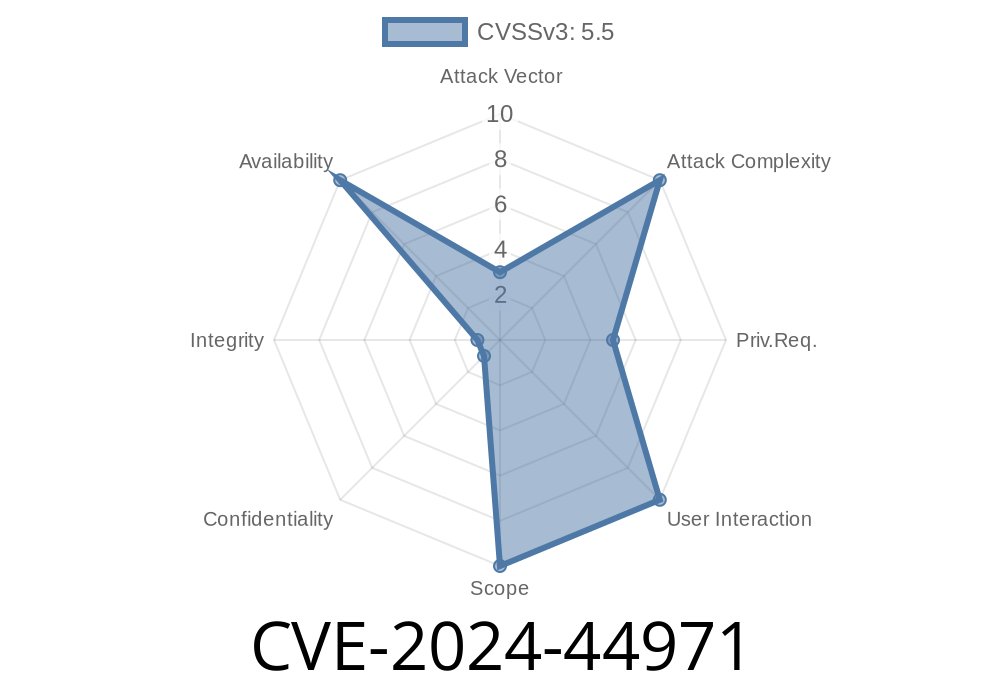The Linux kernel, at the heart of most servers and billions of devices, relies on robust memory management for both security and performance. Recently, a vulnerability identified as CVE-2024-44971 was found and fixed in the net: dsa: bcm_sf2 subsystem, which supports Broadcom network switches via Distributed Switch Architecture (DSA). This exclusive article breaks down the bug, shows key code snippets, and illustrates its impact and exploitation potential.
What Is CVE-2024-44971?
The issue resides in the bcm_sf2_mdio_register() function of the Broadcom SF2 DSA driver. When removing existing PHY (physical layer) devices, this function inadvertently creates a memory leak by not decrementing the device reference count after incrementing it during the lookup.
Root Cause:
- The function calls of_phy_find_device(), which increments the reference count by calling get_device().
- When the loop ends, it's supposed to clean up by freeing the device and decrementing the reference count with put_device().
- The original code failed to do this. Over time, the leak can lead to performance degradation and could, in a worst-case scenario, exhaust system resources.
Vulnerable Version Example
// Inside drivers/net/dsa/bcm_sf2.c:
static int bcm_sf2_mdio_register(struct dsa_switch *ds)
{
...
while ((phydev = of_phy_find_device(child))) {
// Remove existing PHY devices
phy_device_remove(phydev);
// Missing put_device() or phy_device_free() call here!
}
...
}
phy_device_remove(phydev) only unregisters the device but does not decrease the reference.
- The function omits the necessary cleanup, so the system "remembers" each removed device, leaking kernel memory.
The Patch (How Was It Fixed?)
Maintainers fixed the issue by ensuring that every obtained device is properly freed after use.
Patched Version
// drivers/net/dsa/bcm_sf2.c:
static int bcm_sf2_mdio_register(struct dsa_switch *ds)
{
...
while ((phydev = of_phy_find_device(child))) {
// Remove existing PHY devices, as before
phy_device_remove(phydev);
// Free the device to decrement the refcount and avoid memory leak
phy_device_free(phydev);
}
...
}
The addition of phy_device_free(phydev); ensures that the reference count is decreased correctly.
Exploitation Details
This bug is classified as a memory leak vulnerability. It is not directly exploitable for unauthorized privilege or code execution, but it can be used for denial-of-service (DoS):
- An attacker (or even a misbehaving process) with the ability to repeatedly trigger the MDIO registration and removal could cause persistent leaks.
- Over time, this could slow down or destabilize affected network-enabled Linux systems, leading to resource exhaustion and a halt—especially on long-running routers or embedded devices.
Which systems?
- Linux kernels with DSA support for Broadcom SF2 switches (common in some routers, switches, and embedded systems).
References:
- Upstream commit (kernel.org)
- NVD Entry for CVE-2024-44971
Proof of Concept (for Educational Use)
The leak itself is subtle, but here's pseudocode on how repeated MDIO registration/removal cycles could stress the system:
#include <stdio.h>
#include <unistd.h>
// Pseudo interface for demonstration, not actual syscalls
void stress_mdio_register() {
for (int i = ; i < 10000; i++) {
bcm_sf2_mdio_register(/*...*/);
bcm_sf2_mdio_unregister(/*...*/);
usleep(100); // Small delay.
}
}
int main() {
stress_mdio_register();
return ;
}
*In a real kernel module, calling the leaking register/unregister functions in a loop could chew up system memory, eventually causing the OoM (Out-of-Memory) killer to trigger and restart key processes or crash the system.*
People and Systems Impacted
- Developers: If you maintain Linux device trees or network drivers, ensure that device reference counts are balanced. Unbalanced gets and puts are a common class of kernel bugs!
- End-users: It’s important to stay up-to-date with kernel security releases, especially if you're running routers or hardware with embedded Linux and Broadcom switches.
Update your kernel: Get one that includes the patch linked above.
- Monitor kernel logs: Look for warnings about device leakage or unusually high memory usage on embedded/edge Linux systems.
- Audit similar code: Device reference counting bugs are subtle. Developers should be careful to pair every get_device() with a corresponding put_device().
Conclusion
CVE-2024-44971 is a good example of how even a small memory leak in kernel device management code can grow into a real system problem—especially in devices that run for months or years between reboots. While not a privilege escalation or remote code execution bug, it still deserves swift action—patch your systems!
For more on this vulnerability, see the Linux kernel commit or consult the official CVE-2024-44971 entry.
Stay safe and keep your kernels clean!
*[Article by kernel bugwatch, June 2024. Please share responsibly.]*
Timeline
Published on: 09/04/2024 19:15:31 UTC
Last modified on: 09/05/2024 17:54:36 UTC
